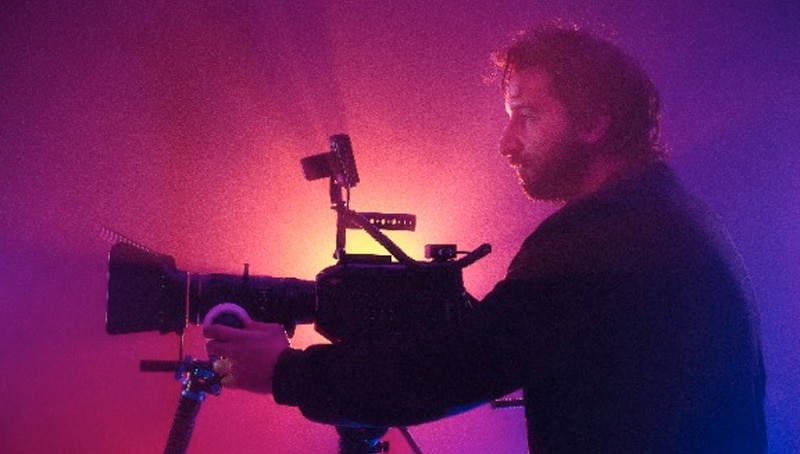FLM 101: Cinematography
Expanding your cinematic point of view
What makes the cinematography of the great filmmakers so compelling? In this course, you will develop an understanding of foundational cinematic principles, including shot types, composition, and lighting, and explore how to apply them in a series of creative projects. The course culminates in a final project demonstrating your ability to plan and execute a visually compelling scene in which actions speak louder than words.

About This Course
Project-Based Learning
Explore multiple aspects of cinematography by analyzing and emulating scenes from existing films and developing a short screenplay, then shoot and edit a series of images to tell your story.
What Skills Will I Develop?
Students in this course can expect to learn to:
- Identify common shot types and shot sequences using by recognized filmmakers and apply them in shooting effective scenes.
- Apply basic principles of shot composition to plan and shoot movie sequences.
- Apply basic natural and artificial lighting in setting up scenes and characters for filming.
- Apply expressive lighting techniques such expressionism, realism, or film noir to set up shots for filming.
- Script, edit and shoot a two person silent scene showing effective command of cinematographic language.
What Software and Supplies Do I Need?
- Computer with a minimum internet connection speed of 512 kbps. Broadband is strongly recommended.
- Adobe Premiere Pro software (course instruction is tailored to this platform).
Students using other non-linear editing programs (e.g., Final Cut Pro, DaVinci Resolve) are welcome to join the class, but should be prepared to adapt to differences in interface and features. - Access to a digital video camera or a smartphone capable of capturing high-quality video.
- Ability to transfer video from camera/smartphone to computer.
Are There Course Prerequisites?
There are no prerequisites for this course.
If you have any questions about this course, please contact Admissions@sessions.edu.
Course Instructor(s)
The course is taught by the following instructor(s):

Valeriya Golovina is a Ukrainian cinematographer, documentary filmmaker, and educator whose work has been screened in over 30 countries.
View all Faculty
Course Outline
Intro to Filmmaking
What are movies? What's involved in making a movie? And most importantly: How can you make a movie? Explore the exciting roles involved in filmmaking from director, editor, cinematographer, and screenwriter. You'll build a strong foundation by learning how the disciplines of screenwriting, cinematography, directing, and editing interact in the professional world.
Shot Sizes and Their Functions
Examine the essentials of shot types and what they’re used for. Get the basic cinematographer’s vocabulary down and learn how to thoughtfully choose the best shot type to tell a story and make an impact on your audience.
Composition & Depth: Part I
Filmmakers have to prioritize visual information within the frame of a shot because every second counts when making a movie. Starting with the beginnings of filmmaking in the 1920’s, you’ll see how compositions have changed and evolved from flat, almost theatrical-like shots to more ornate and experimental compositions that consider depth of field like those found in cinematographer Gregg Toland’s Citizen Kane.
Composition & Depth: Part II
Great cinematographers know how to work with the space that they’ve been given. They know that "every shot should show us something new." Some compositions are packed full of information, while others are purposefully simple. As we start exploring more contemporary examples of great cinematography, you’ll see how art and social movements of the past influence compositional choices.
Light and Shadow
Professional filmmakers rely on lighting setups, lenses, and filters that can become expensive when you’re just starting out. However, we’ll also look at creative approaches to inexpensive lighting options without compromising quality and ways to use shadow as a “cheap special effect” that can mask any imperfections. As always, the big question is: what does it all mean? How does your lighting impact your story?
Silent Scene
It takes both sight and sound to make a movie, but the art of cinematography is one of visual communication. In your final project you will test these visual skills. You will develop, write, direct and edit a short piece that explores the dramatic potential of a primarily visual conflict between two people.
Frequently Asked Questions (FAQ)
How Do The Courses Work?
Our courses are project-based and instructor-led. In each course you’ll complete a series of lectures, projects, discussions, and critiques designed to stretch your creative skills. Weekly assignment deadlines keep you on track, and with no set-logins or Zoom meetings, you can build your studies around your schedule.
Who Are The Instructors?
Our courses are developed and taught by our industry-leading faculty of creative professionals. This means that you’ll learn in-demand skills, get feedback on your work, and build a portfolio of creative work. View our Student Gallery for featured student projects.
When Can I Start?
Classes start January, April, and August, and this course is completed in a 15-week term. College credit from this course can be applied to a range of Degree and Certificate programs at Sessions College. You can enroll in this course on an individual basis or as part of a program.
Explore our Programs: Bachelor's Degree | Associate Degree | Undergraduate Certificate
How Do I Register?
To register for a program, complete our program application. To register for this course on an individual basis, please contact our admissions team at admissions@sessions.edu. An Admissions Advisor will contact you to setup your enrollment.
| Course Tuition and Fees | |
|---|---|
| Tuition | $350/credit |
| Registration Fee* | $200 |
| Total Course Price | $1250 |
Registration fees are nonrefundable after 5 days from enrollment.
Is Sessions College Accredited?
Yes. Since 2001, Sessions College has been accredited by the Distance Education Accrediting Commission (DEAC). The Distance Education Accrediting Commission is listed by the U.S. Department of Education as a recognized accrediting agency and is recognized by the Council for Higher Education Accreditation (CHEA).
RELATED PROGRAMS AT SESSIONS COLLEGE:

